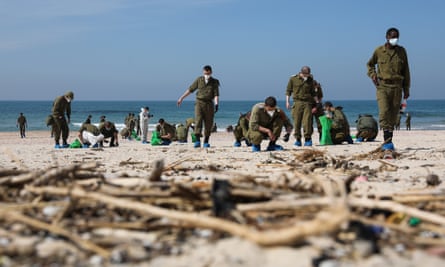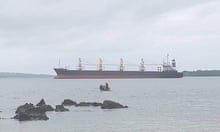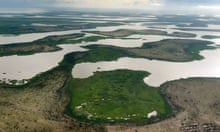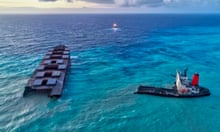At first sight there are few obvious signs of the oil spill on the Mediterranean beach. Wooden parasols stand solitary in the sand, while a few runners make their way along the waterline, enjoying the winter sun.
“The beach looks OK, but it’s all underneath,” says a volunteer, sitting at a water station on the boardwalk. “It’ll take decades to clean.”
In front of her, several large canvas bags contain the detritus of the disaster – clumped sand, rope and plastic bottles. Everything is covered in thick tar.
Other volunteers at this beach in the Israeli city of Ashdod trudge around in rubber boots, black gloves and white protective overalls, combing the sand with garden rakes.
Israel is reeling from a massive tar slick that left black globules along almost the entire length of its 120-mile (195km) coastline. Reports of oily sand found on beaches in southern Lebanon have prompted concern of wider damage.
Possibly 1,000 tonnes of tar has washed up, apparently brought in by high waves from a large storm that hit last week. Environmentalists have warned of a catastrophe, with beachgoers finding baby turtles and fish covered in black sludge.
After some civilian volunteers who had cleaned up over the weekend were hospitalised, possibly for inhaling toxic fumes, officials warned only organised efforts with proper protective equipment should continue.

The head of Israel’s nature and parks authority, Shaul Goldstein, has called it “the worst environmental disaster in a decade”. Park rangers have been joined by soldiers to deal with the fallout.
On Ashdod’s beach on Sunday, the country’s environmental protection minister, Gila Gamliel, announced the cleanup would cost tens of millions of shekels (millions of pounds) and that the country was considering “suing the insurance company of the ship that is responsible for the pollution”.
Israel has yet to announce the suspected source of the spill. Investigators were using satellite images and wave models to narrow the search, with several possible culprit ships being looked at.
“Our moral obligation to the public is to locate those responsible for the event,” said Gamliel.
Investigators hoped they might have found an extremely large clue that washed up on a beach in southern Israel late last week: a 17-metre (55ft) fin whale.
An autopsy found oil-based liquid in its lungs, and although it was not certainly related, an analysis of when the whale died may help point to a timeframe for the spill.
It is possible, however, that the country already has a good idea of who is responsible but is holding off on announcing it, perhaps because of diplomatic or corporate sensitivities. An Israeli judge issued a gag order on information pertaining to the investigation on Monday, including details that might identify the suspects.
The true damage to wildlife and ecosystems is yet to be ascertained, as tar at sea could still wash in.
In Lebanon, north of Israel, the caretaker prime minister, Hassan Diab, said on Monday the spill had reached his country’s southern shores. Sticky black deposits were visible on beaches in a nature reserve near the city of Tyre, where endangered loggerhead and green sea turtles nest.
South of Israel, in Gaza, an official said the beaches were clean, which they attributed to fortuitous north-heading currents.
Israel’s government hopes by late March, when the bathing season begins, the beaches will at least be in a safe state to reopen to the public.
In Ashdod, the Gorilla Surf and Skate shop had just opened its doors on Sunday for the first time in weeks, after the country gradually began exiting a several weeks-long coronavirus lockdown.
Although the seas are quieter for bathers in winter, many surfers prefer the large waves built up by offshore storms, said the shop’s owner, Kobi Shahar. The 51-year-old had been surfing off Ashdod’s coast for two decades and said in that time he could not remember such a similar catastrophe.
Several government ministries have urged people to avoid the beaches for bathing, sport and leisure until further notice. “Exposure to tar can risk the public’s health,” the said in a joint statement.
But Shahar said some surfers of his generation had gone out on the waves this weekend despite the warnings. “When I was a kid, there used to be a lot of oil in the sea,” he said. “We had gotten used to it.
“A lot of the older guys said: ‘Why not?’”.








